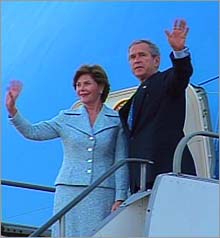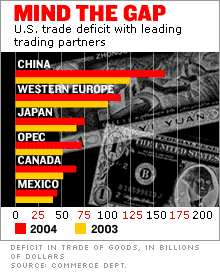 |
| Bush embarks on a trip to Asia to meet with Chinese president Hu Jintao as trade issues between the U.S. and China become more contentious. |
|
 |
|
|
|
|
|
|
NEW YORK (CNN/Money) -
Trade between the United States and China has never been more central to both nations' economies. That makes closing the soaring trade gap more important, and more difficult than ever.
Faced with that reality, it's clear that the stakes are high for President Bush, who's dogged by growing political problems at home, when he meets with Chinese President Hu Jintao this week in both Korea and China. Experts aren't looking for the changes that critics of Bush's trade policies demand.
Bush, in a speech in Japan Wednesday, called on China's leadership to allow greater freedoms for its citizens.
"As the people of China grow in prosperity, their demands for political freedom will grow as well," Bush said in a speech in Kyoto, Japan. "By meeting the legitimate demands of its citizens for freedom and openness, China's leaders can help their country grow into a modern, prosperous and confident nation."
But it'll be economic issues that will likely dominate the talks between the two leaders at the Asian Pacific Economic Cooperation summit in Busan, South Korea, and during Bush's subsequent trip to China.
"I think President Bush was speaking to an audience at home and to other countries in the region that want to see that the U.S. is still committed to human rights reforms in China," said Elizabeth Economy, director of Asia studies at the Council on Foreign Relations. "The bilateral discussions will be trade, currency exchange rates and more trade, with some side issues like avian flu and energy."
Bush will be meeting with the Chinese leader at a time of growing concerns at home about the flood of Chinese imports.
While China is the fifth-largest market for the export of U.S. goods, its own exports to the United States have outstripped its imports by $146 billion in the first nine months of this year, on pace to crack the $200 billion mark by the end of 2005.
Critics of China, and the Bush administration policy toward it, say that the Bush administration needs to do more to press the Chinese to let its currency, the yuan, appreciate to a higher value, which would raise the cost of Chinese goods and reduce the competitive advantage that the Chinese manufacturers have on U.S. producers. China pegs the yuan to the value of the dollar, allowing only a small move earlier this year.
"The real problem is the absence of resolve in the Bush administration to deal with China," said University of Maryland Professor Peter Morici. "It's policy toward China is not in shambles, but it's very close to it."
Congress has legislation pending that would impose a steep 27 percent tariff, or tax, on Chinese imports if there is not a significant revaluation of the currency. The legislation has bipartisan support.
Sen. Lindsey Graham, R-S.C., and Sen. Charles Schumer, D-N.Y., the chief sponsors of the legislation, said Wednesday they would delay a vote on the bill until March 31 at the latest.
China's leadership is likely more concerned about that threat than it's letting on, according to experts, who point out that China dropped its bid to have Chinese oil giant CNOOC buy Unocal earlier this year in the face of congressional opposition.
The two nations recently struck an agreement to place limits on Chinese exports to the United States for 34 textile and clothing categories through the end of 2008. Some experts also expect that Chinese officials could announce some plans to increase purchases of some U.S. goods such as aircraft during Bush's visit.
But both experts had doubts that there will be any breakthrough in talks between Bush and Hu.
"I think a big move is very unlikely because the regime is very concerned about maintaining economic growth. I think short term the president and [U.S. Treasury Secretary John] Snow are not going to get what they want," said Nicholas Lardy, a senior fellow at the Institute for International Economics. "Longer term, it could be a different story."
While Morici and some others suggest that both the U.S. and Chinese economies would weather the disruptions caused by a large sudden shift in currency exchange rates, others say a shift could cause a sharp problem for both economies.
Not only would some Chinese factories lose business, but if China stopped buying U.S. treasuries to keep the yuan pegged to the dollar, it could drive up U.S. interest rates as well.
"We never had an economic relationship with Russia before the fall of the Berlin Wall, so we could push Russia, and there was never any risk of economic war. Our relationship with China is much more complex," said Jay Bryson, international economist for Wachovia Securities.
"A 30 percent appreciation of the yuan over the next year could be a destabilizing blow to their economy. That could lead to political upheaval. I don't know if at the end of the day you want that," said Bryson. "And whether it's Wal-Mart or old-line U.S. manufacturers or Silicon Valley, there are a lot of U.S. businesses that depend on low-priced Chinese inputs."
Even Morici doesn't believe the United States by itself has enough leverage to push China to significantly revalue its currency. But Economy said she doesn't expect the Bush administration to win much support for such a move from other Asian nations at the APEC summit.
"The region as a whole, and all the major economies there, maintain a trade surplus with China," she said. "It's not a big issue for APEC."
For a look at further look at the risks and rewards of a yuan revaluation, click here.

|